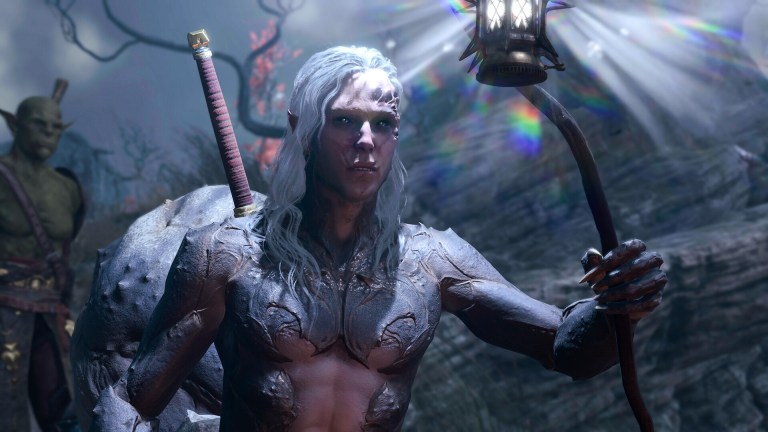Baldur’s Gate 3’s Record Player Count Is One of 2023’s Best Surprises
Baldur's Gate 3's Steam player count is even catching its developers by surprise.

2023 has seen more than its fair share of amazing and successful titles so far. The Legend of Zelda: Tears of the Kingdom, Hogwarts Legacy, and Resident Evil 4 Remake are just a few of the notable games this year that have raked in both critical acclaim and cash. Of course, many gamers probably could have predicted that those titles would eventually be counted among the year’s most successful new releases. What we’re seeing from Baldur’s Gate 3 so far is much more surprising.
On August 3, Larian Studios officially released Baldur’s Gate 3. The game had been in Early Access since 2020, but the studio finally decided that their biggest game yet was ready for the general gaming public. Interestingly enough, we may still be waiting for Baldur’s Gate 3 if Starfield‘s September release date didn’t seemingly inspire Larian to move up the release of the PC version of their latest game.
Just as expected, fans of both this franchise, Larian, and D&D-style CRPGs have welcomed Baldur’s Gate 3 with open arms. However, it wasn’t known exactly how many gamers belonged to those fan groups, how many of those gamers would end up buying Baldur’s Gate 3, or if the game would appeal to those outside of its somewhat hardcore audience. As of writing, though, Baldur’s Gate 3 is the top-selling game on Steam. According to industry reporter Benji-Sales, Baldur’s Gate 3 is also the second biggest Steam launch of 2023. If it weren’t for Hogwarts Legacy, Baldur’s Gate 3 would be number one.
Moreover, Baldur’s Gate 3 is the second-most played game on Steam at the moment with over half a million concurrent players. That makes Baldur’s Gate 3 more popular than legacy titles like PUBG: Battlegrounds, Apex Legends, and DOTA 2. More importantly, Baldur’s Gate 3’s peak concurrent popularity has already eclipsed blockbuster RPGs such as Fallout 4. This popularity extends to Twitch, where Baldur’s Gate 3 is currently the third-most watched channel behind only Counter-Strike: Global Offensive and “Just Chatting.” Even the Baldur’s Gate 3 team didn’t seem to anticipate this level of success so early on:
What makes Baldur’s Gate 3’s popularity so surprising, you may ask? Among other things, the game’s developer, Larian Studios, is technically an indie company that doesn’t have access to the budget or resources that the industry’s biggest developers do. Moreover, the previous Baldur’s Gate entries, and Larian’s prior game, Divinity: Original Sin 2, are generally considered to be somewhat niche titles from a mass market perspective. They are some of the greatest RPGs of all time, but they were never known for their sales numbers compared to further-reaching genre titles like The Witcher 3 or Skyrim. So what changed with Baldur’s Gate 3? I have some theories.
Baldur’s Gate 3‘s stunning popularity should at least partially be attributed to the ever-expanding reputation of its franchise. The first two Baldur’s Gate titles were released in 1998 and 2000, respectively. Despite several successful sequels and spin-offs, the franchise was effectively dead for years until 2012 when Beamdog started publishing remasters for then-modern systems. In that decade or so of absence, the Baldur’s Gate games have appeared on many “best RPGs” lists and have slowly achieved a mythic status that possibly got more and more types of gamers interested in what makes Baldur’s Gate so great. The reputation that Larian also built during that time certainly didn’t hurt the game’s prospects.
There’s also Baldur Gate 3‘s monetization plan, or, to be specific, its complete lack of one. The game might come in several editions with their own price points, but they are all essentially complete experiences. There are no microtransactions or battlepasses, which is more than can be said for 2023’s other RPG revival, Diablo 4. While that game launched to impressive numbers, a series of questionable updates (and the microtransactions that came with them) have hindered the live service title. After a few too many experiences like that, Baldur’s Gate 3 and its lack of microtransactions start to look a lot more appealing.
Last, and certainly not least, is the nature and scope of the Baldur’s Gate 3 experience. The sheer size of Baldur’s Gate 3 has stunned even those within the gaming industry and has remained a talking point throughout the game’s extended Early Access period. Games like this are rare, and they’ve become a lot more rare in recent years given that famous RPG studios like BioWare and Bethesda are no longer nearly as prolific as they once were. The success of Baldur’s Gate 3 may be partially representative of the greater desire for more games like it.
And that could end up being the biggest takeaway from Baldur Gate 3‘s early success. Larian Studios will probably produce DLC campaigns for the game (and, one day, maybe even Baldur’s Gate 4). Moreover, we might eventually see more companies try to copy the Baldur’s Gate 3 formula and produce massive CRPGs of their own that emphasize player choice and exploration. While Baldur’s Gate 3’s success will also probably result in more than a few clones that don’t understand why the game works, there is at least some hope that this title will at least prove that there is a bigger market for games like this than many would have previously thought. Here’s hoping for the best.
